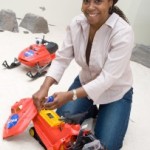
 Bias is bad, or so we’ve learned. And yet we all have prejudgments that have formed over time in complex ways. New research is indicating that employing some of our prejudices on the job sometimes can help advance the world.
Bias is bad, or so we’ve learned. And yet we all have prejudgments that have formed over time in complex ways. New research is indicating that employing some of our prejudices on the job sometimes can help advance the world.
Cordelia Fine (right), a senior research associate at the Melbourne Business School, recently wrote in the New York Times:
Some academics have recently suggested that a scientist’s pigheadedness and social prejudices can peacefully coexist with — and may even facilitate — the pursuit of scientific knowledge.
She introduces us to:
the philosopher of science Heather Douglas (left) [who] has argued that social values can safely play an indirect role in scientific reasoning. Consider: The greater we judge the social costs of a potential scientific error, the higher the standard of evidence we will demand. Professor A, for example, may be troubled by the thought of an incorrect discovery that current levels of a carcinogen in the water are safe, fearing the “discovery” will cost lives. But Professor B may be more anxious about the possibility of an erroneous conclusion that levels are unsafe, which would lead to public panic and expensive and unnecessary regulation.
Both professors may scrutinize a research paper with these different costs of error implicitly in mind.
First, did you note Douglas’s role? She’s a philosopher, specifically of science. There are millions of occupations out there!
And next, it seems reasonable to apply this analysis to the everyday workplace, no? Yet we caution: we’re talking only about thoughtful conclusions that have been considered with an open mind, and not knee-jerk reactions about whole groups of people.
Dr. Fine concludes the article with the statement:
Maybe progress would be even faster and smoother if scientists would admit, and even embrace, their humanity.
Hooray for bringing your whole self to work! Revealing the stuff of which we humans are made in this case can help propel progress. We considered inducting Dr. Fine into the Whole Wide Work Hall of Fame for making this declaration, yet first we’d like to see more similar work from her.
In conclusion, feel free as you engage all your many facets at work; even your biases can make your work output better.



